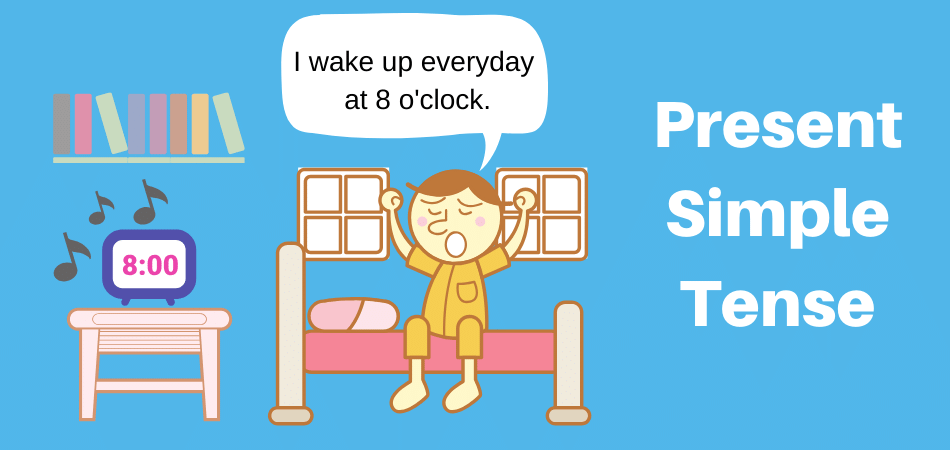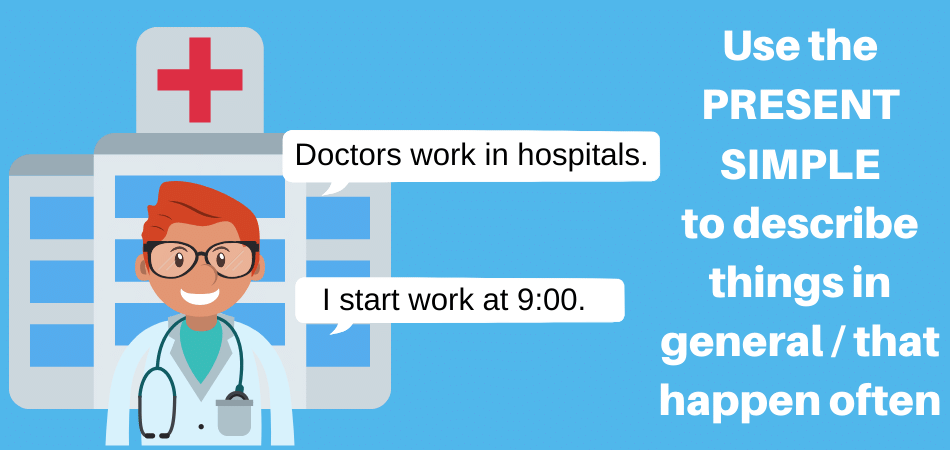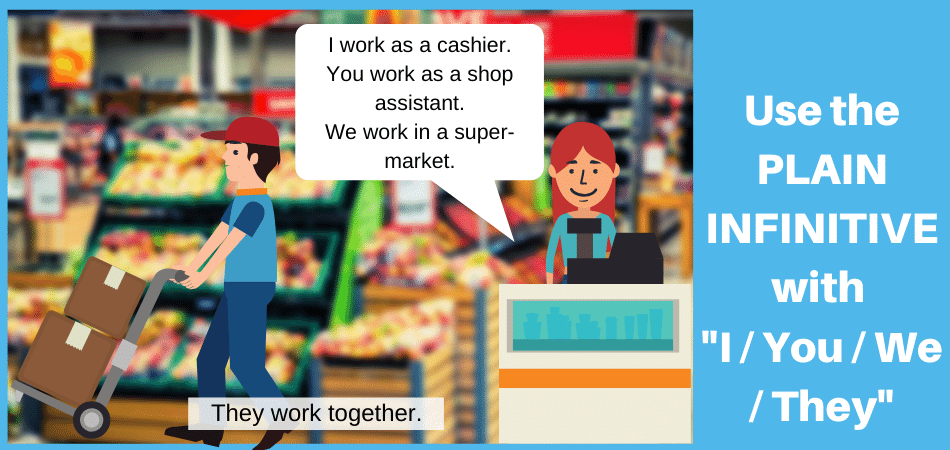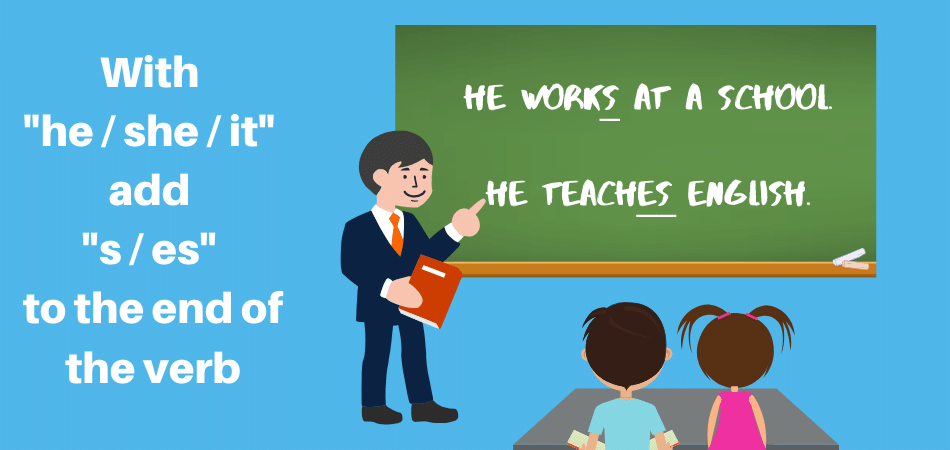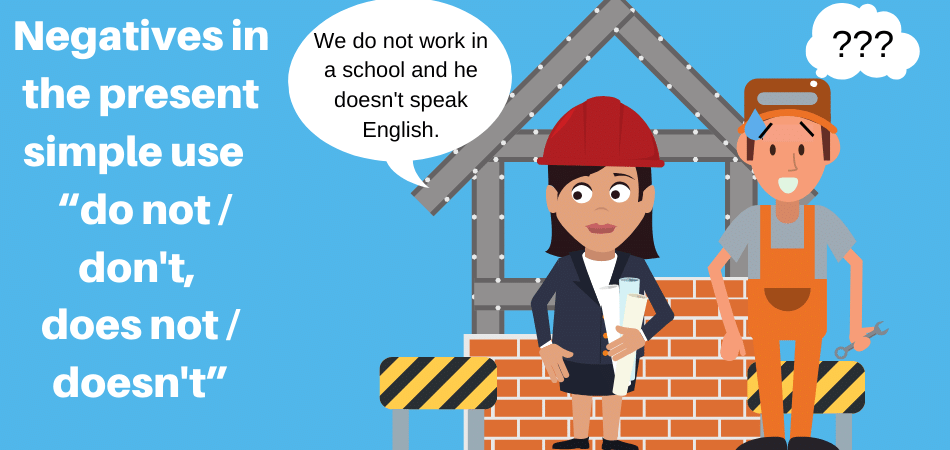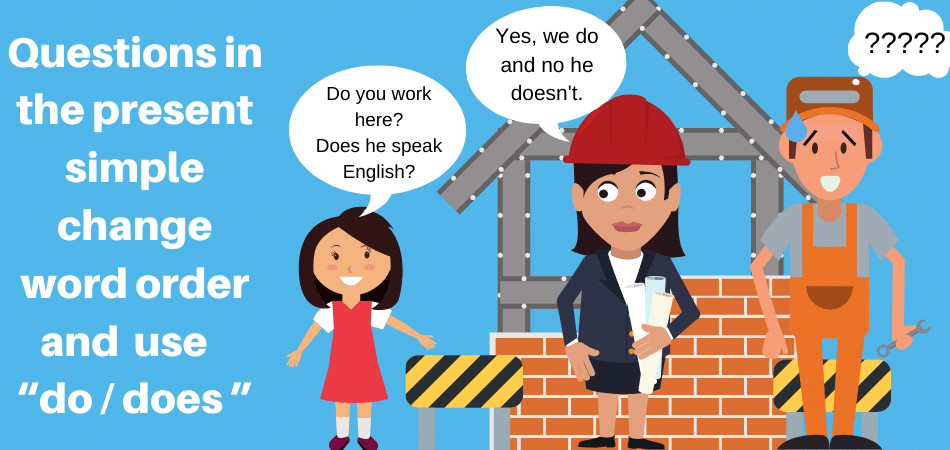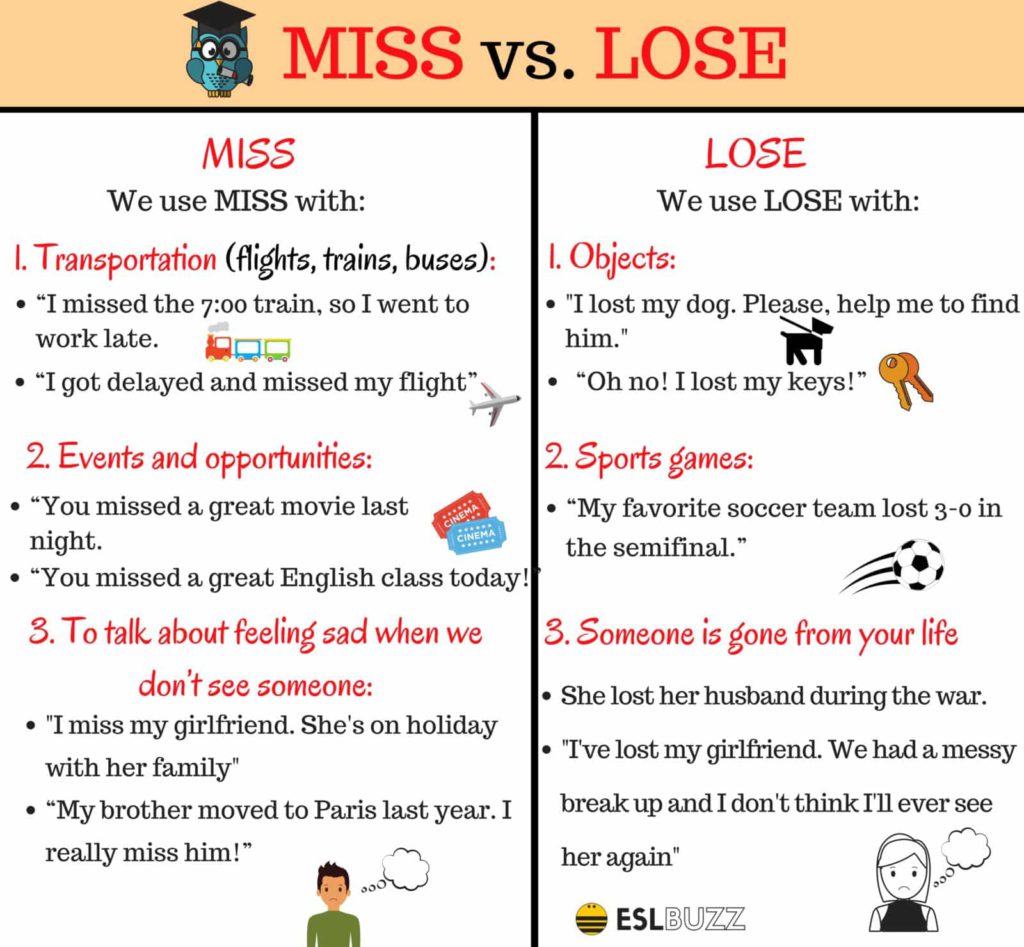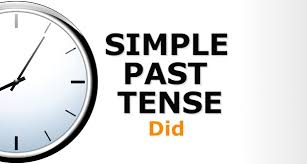
Verbs come in three tenses: present, past, and future.
The present tense is used to to talk about things in general. We can use it to describe actions that happen frequently or situations that are generally true.
The future tense describes things that have yet to happen (e.g., later, tomorrow, next week, next year, three years from now).
And the past tense. We use the past tense to talk about an action which happened at a precise point in time and is completely finished (e.g., earlier in the day, yesterday, last week, three years ago).
Listen carefully to this video. Take notes.
In the present simple tense, we say:
- I/you/we/they live …
BUT, for HE, SHE and IT, we add an S to the end of their verb in the present simple. So we say:
- He/she/it lives …
However, for the past simple tense it is much easier.
There is only one form of each verb in the past simple tense.*
* The exception is TO BE which has two forms: was and were.
The past tense of LIVE is LIVED. It is the same for all subjects including HE, SHE and IT. There is only one form for each verb.
- I lived …
- You lived …
- We lived …
- They lived …
- He lived …
- She lived …
- It lived …
How do we make a past tense verb?
To make a past tense verb, we normally just add -ED to the end of a regular verb.
- play becomes played
- rain becomes rained
- cook becomes cooked
- watch becomes watched
- need becomes needed
- want becomes wanted
If the regular verb already ends in -E, we just add a -D to the end.
- live becomes lived
- smile becomes smiled
- dance becomes danced
Let’s look at some more example sentences using regular verbs in the past simple tense:
- I played my guitar yesterday.
- It rained last night.
- He fixed his bike last weekend.
- Angela watched TV all night.
- Paul wanted to go to the museum.
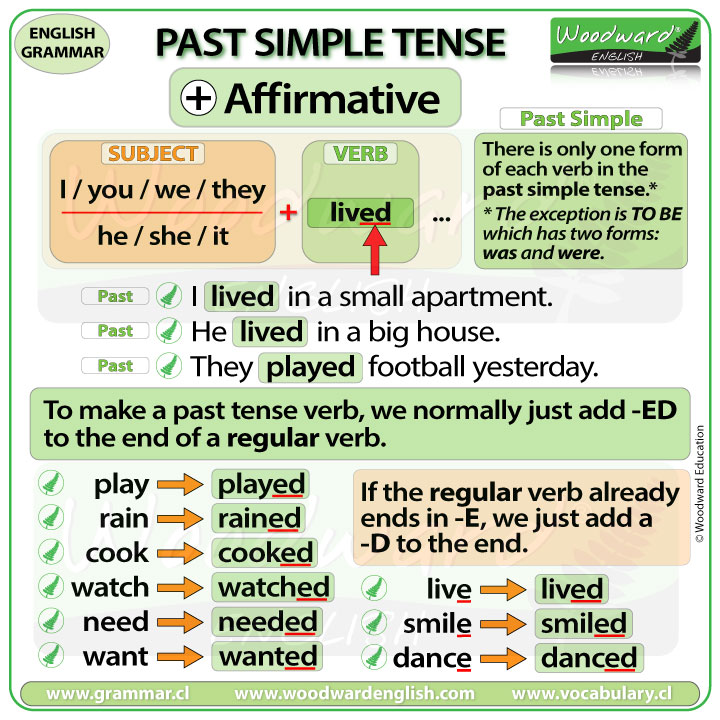
How do we make a negative sentence in the past simple tense?
Didn’t is used to make negative sentences in the past simple tense.
- They lived in Spain … becomes …
- They didn’t live in Spain.
We do not say they didn’t lived in Spain. No!
Remember, in the present simple tense, don’t and doesn’t are used. In the past simple tense, we only have one auxiliary: didn’t.
I didn’t, you didn’t, we didn’t, they didn’t, he didn’t, she didn’t, it didn’t.
The verb after didn’t is always the base form of the infinitive.
didn’t live … didn’t play… didn’t watch
Some more examples of negative sentences in the past simple tense:
- I didn’t want to go home.
- You didn’t need my help.
- He didn’t like the soup.
- She didn’t open the door.
- We didn’t say anything.
- They didn’t drive to work.
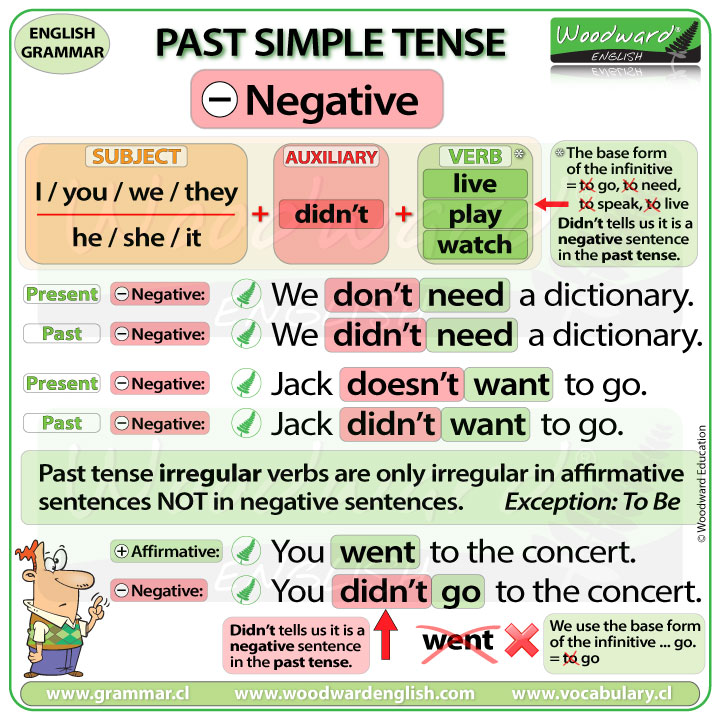
But how do we make a question in the past simple tense?
We use DID to make questions in the past simple tense.*
* Exceptions: Questions with To Be or Modal Verbs (can, might, must, etc.)
- They lived in Spain … becomes …
- Did they live in Spain?
Notice how we use the base form of the infinitive, just like with negative sentences.
We do not say: Did they lived in Spain? No!
Some more examples of questions in the past simple tense:
- Did I win the prize?
- Did you need my help?
- Did he like the soup?
- Did she open the window?
- Did we arrive on time?
- Did Steve walk to school?
Short Answers in the Past Simple Tense
With questions beginning with DID, you can often give a short answer.
Look at these questions. What are some possible short answers?
- Did you need my help?
Yes, I did … or … No, I didn’t. - Did she open the window?
Yes, she did … or … No, she didn’t. - NOT IN VIDEO: Did we win the game?
Yes, we did … or … No, we didn’t. - Did Steve walk to work?
Yes, he did … or … No, he didn’t.
Question Words in the Past Simple Tense
With questions, you can also use one of the “question words” such as when, where, why, what, who, which etc. before DID.
Look at these example questions:
- When did you arrive?
- Where did they go?
- Why did she leave early?
- What did he say?
- Who did you see?
- Which did you choose?
- How did you learn English?
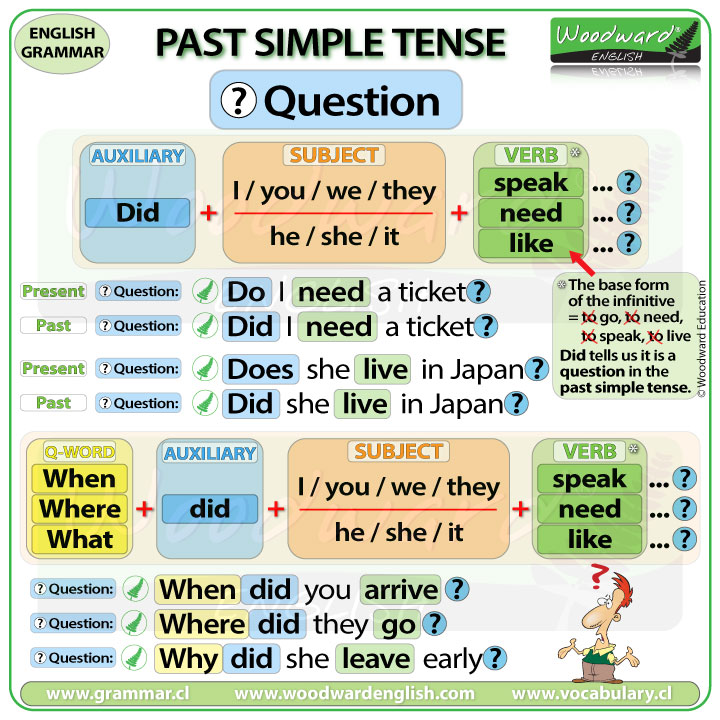
Past Simple Tense – Irregular Verbs – Affirmative Sentences
Let’s look at the verb TO GO.
In the present tense it is GO or GOES.
The past tense of GO is WENT.
WENT is used for all subjects…
I went, you went, he went, she went, it went, we went, and they went.
They all use WENT. For example:
- I went to the beach last weekend.
- She went to the dentist last week.
- They went to the library yesterday.
- You went to a concert last night.
Past Simple Tense – Irregular Verbs – Negative Sentences
For negative sentences in the past tense, we follow the same rules as regular verbs.
We use didn’t with the verb in its base form. For example:
- You went to the concert.
- You didn’t go to the concert.
Notice how we use just GO instead of TO GO.
We don’t say: You didn’t went to the concert. No!
Past Simple Tense – Irregular Verbs – Questions
We use DID at the beginning while the verb is in the base form of the infinitive.
- Did you go to the concert?
Notice how we use just GO instead of TO GO.
We don’t say: Did you went to the concert? No!
Past Simple Tense – Irregular Verbs – Summary
So basically, past tense irregular verbs are only irregular in affirmative sentences.
AND there is only one form for each verb. For example:
- You went to the concert.
- You didn’t go to the concert.
- Did you go to the concert?
You can see that GO is only irregular in affirmative past tense sentences when it becomes WENT. In negative sentences and questions, we use GO.

